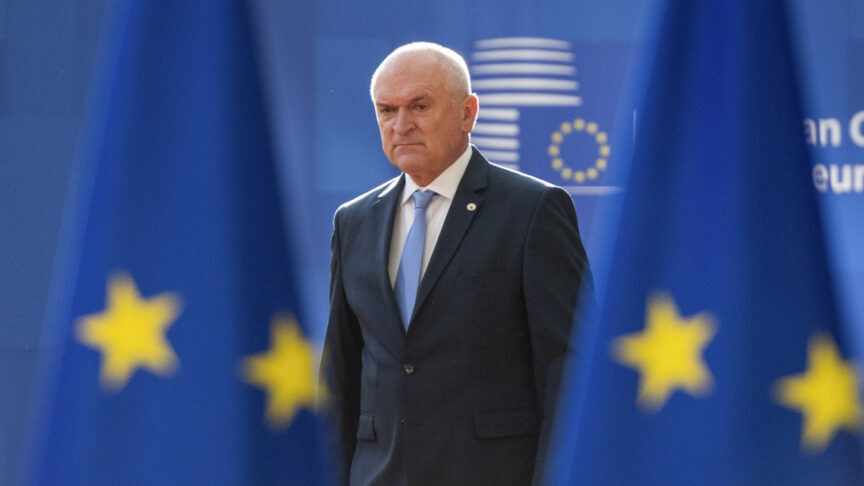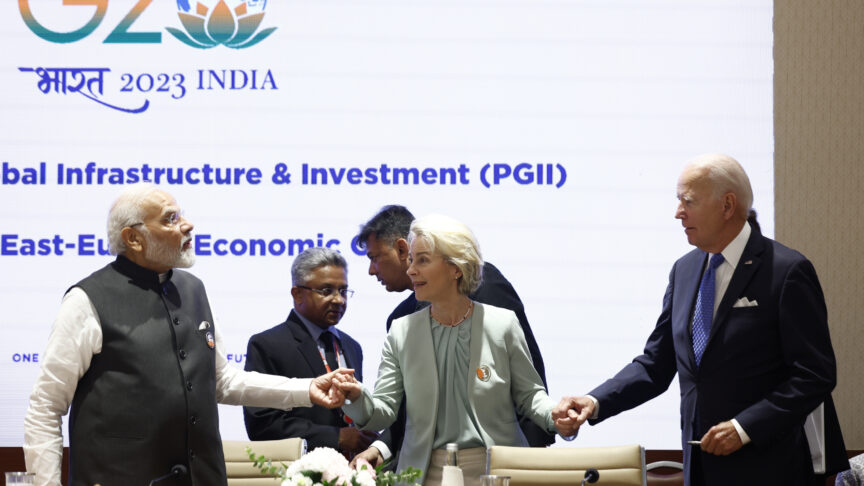The three eras since reunification
Almut Möller's farewell Note from Berlin looks at the three eras of German political history since the fall of the Berlin Wall 30 years ago
This will be my last Note from Berlin. I am leaving ECFR after four great years, and after 20 years in the world of think-tanks. As it happens, this autumn also marks 30 years since the fall of the Berlin Wall. So, this is a good moment to step back and ask where Germany is at today, three decades after returning to the global stage as a reunified country with a strong European orientation.
Broadly speaking, one can divide the past 30 years into three chapters. All three have seen Germany play a key role in the development of the European Union and wider Europe.
The deepening and widening years
One could call the first chapter the “deepening and widening years”, which began with negotiations on the Maastricht Treaty. The treaty developed the European Economic Community into a union with ambitions to go beyond its market focus – by embracing cooperation on justice, home affairs, foreign policy, and external security. This period also involved subsequent treaty reforms, with the treaties of Amsterdam and Nice, and a draft constitution that – following referendum votes against it in France and the Netherlands – was downgraded to what became the Lisbon Treaty in 2007.
Apart from deepening integration, the EU also grew from 12 to 27 members by 2007. Treaty reform was the main driver of change in the deepening and widening years, with intergovernmental conferences and, later, the European Convention paving the way for successive rounds of renewal of the founding treaties. This legal modus operandi suited successive German governments in Bonn and Berlin: the notion of the EU as a community of law (Rechtsgemeinschaft) still resonates widely with the political elite and, arguably, the wider public in Germany.
The crisis years
However, the start of the second phase of European integration shortly after the adoption of the Lisbon Treaty pushed the German government outside its comfort zone. These were the “crisis years” of European integration, running from the eurozone crisis to Russia’s annexation of Crimea, to the migration crisis. In this era, the European project’s modus operandi was a kind of relentless crisis-fighting, with little time to engineer neat legal responses, let alone allow for the kinds of months-long deliberations that characterised intergovernmental conferences in the 1990s. The crisis years also saw the rise of political competition, as well as German strength within the union. However, successive governments in Berlin could not translate this strength into powerful European responses. Their inability in part stemmed from the fact that EU politics eventually became a source of contention in the German public discourse.
German reunification and the gradual integration of European countries under the political umbrella of the EU had helped create an optimistic mood in Germany throughout much of the 1990s and early 2000s. Yet this gradually dissipated. The EU no longer seemed to promise a happy and prosperous future, but suddenly looked like a bag full of problems – which, to most Germans, were the problems of “the others”.
Both political elites and the wider public were shocked to discover that the architecture of the euro area was so vulnerable as to risk a dramatic collapse in hard times. Only a few years later, the shortcomings of the Schengen system exposed yet another vulnerability of the EU system when large numbers of refugees made their way into Europe. Germans had never had a stronger belief that their country’s economic and political prowess was inextricably linked to the entire union’s vitality. The crisis years will also be remembered as largely overlapping with the chancellorship of Angela Merkel. She no doubt played a key role in keeping the union together, but never really managed to go beyond this by fixing the problems that held it back.
One reason for this failure to translate German power into European strength has little to do with the weakness of Germany’s partners – even if this idea has created a powerful narrative in Germany. Indeed, a key factor has been Berlin’s inability to navigate a highly politicised EU environment. Handling EU politics in the crisis years meant embracing a new inner logic: events of the era were driven much less by the creation of laws than by political manoeuvres – a reality that successive Merkel governments have never fully understood. In comparison to EU member states that had long witnessed the contestation of EU politics at home, Germany was the new kid on the block. In 2018 Alternative for Deutschland entered the Bundestag with force, becoming the largest opposition group in parliament and challenging the EU consensus in unprecedented ways.
European disintegration?
That is why one can identify the start of a third phase of integration in 2018. In Germany, this phase will be marked by the departure of Merkel at the end of her current term, if not earlier. It will be defined by the first example of European disintegration, with the United Kingdom likely to crash out of the union. And, as far as Germany is concerned, it might be a period that reconciles the legal mode of EU reform in the 1990s with the heavily political crisis years, pushing future German governments to take a more realistic approach to the politics of European integration.
Arguably, such normalisation of Germany’s outlook on EU affairs will make it more difficult to fire up the Franco-German engine. In his September 2017 speech at the Sorbonne, French President Emmanuel Macron expressed greater ambition than his counterpart on the other side of the Rhine. Nonetheless, Berlin has perhaps not fully understood his approach. Yes, Macron is more of a visionary than Merkel – but, more importantly, he approaches the EU as a political game that plays out in various arenas.
From this perspective, political Europe is perhaps less likely to propel joint Franco-German initiatives than it has in the past, as there are significant differences between political sentiment in France and that in Germany. Of course, this has always been the case. However, as European integration once followed a different logic, these differences did not really matter but rather helped the Franco-German engine productively reconcile various camps within the EU. In today’s politicised EU, Macron increasingly looks to create majorities that cross political lines in other EU member states. This, then, suggests that the third phase of Europeanisation is already in full swing – and that France and Germany will have to find a new joint modus operandi.
The European Council on Foreign Relations does not take collective positions. ECFR publications only represent the views of their individual authors.


